We Need to Redefine Insanity
This is an article about bricks. Bricks are normally brownish red (earthware) but can take a variety of colors, everything from white (stoneware) to even rare and valuable bricks. One such valuable brick is the supreme brick (shown below). The men’s fashion brand Supreme, believe it or not, sells a brick with its logo. Bricks with a light, whiteish, or yellow tint occur when the clay has a high lime content instead of being high in iron.

Onto the topic, now that they’re off our trail
Ok, now that the feds have been bored to tears, let’s discuss the real topic of this article. The real topic of this article is the 2007 PC game by Valve Corporation, commonly known as Team Defense Fortress 2. In tf2, there is a common portrayal of the character “Scout,” a fast-running character with a shotgun. He is often portrayed as a kid, often getting into all kinds of trouble (shown below). There is also a character named “Soldier” who can do long jumps by shooting towards his feet and jumping. This is impossible in real life and will get the person attempting to do this killed.
Now onto the actual topic
Now that all the women are gone, we can move on to the topic. The actual topic of this article regards economies of scale. Economies of scale, to put it loosely, can sum down to the fact that the bigger a company is, the more material it can produce and, therefore, the more money it can make. Larger factories can pump out more materials faster than smaller factories. In addition, fixed cost becomes variable in the long run, as long run businesses need to pay out fixed cost many times to expand, which does not happen in short-run microeconomics. With economies of scale, if expansion occurs to quickly, a company could be inefficient to expand that quickly, and would incur losses.
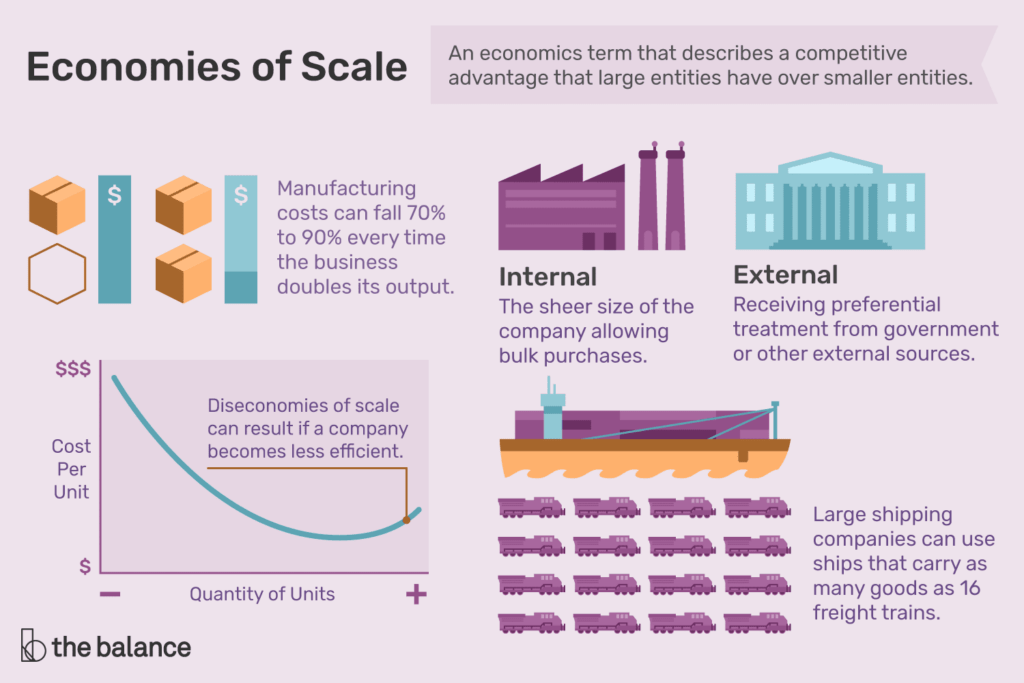
Okay this time for real 😉
Okay, now that anyone who does not understand how the world works is gone, let’s discuss the real topic at hand. The real topic at hand is insanity. Specifically, the fact that we can no longer use the metrics we used to use to determine the sanity of an individual. I am not talking about how psychologists see it; instead, I am referring to how the general public sees a person.
Onto the Real Stuff
We can no longer say that someone who thinks the government is watching them is insane because the government is watching them. In fact, many of the things that people have been incredibly scared about for years and years are beginning to become true.
Consider the following: social media has gone a long way since the old days of MySpace. Social Media companies design social media to be addictive. This does not make sense to a lot of people and it seems like mind control. However, it really is rather simple. I’ve created a thought experiment to help people visualize it.
Imagine if you enter into an argument on the internet. If you were to put the phone down, then the other person would say something, you wouldn’t respond for a while, and they’d get the last laugh. This could result in the general public being turned away from you, in turn could have disasterous consequences, but in reality that is only what the human mind percieves. If you were to put the phone down, you could forego imaginary internet points. However, imaginary internet points are just that. But by creating said points, it creates a scenario of mutually assured destruction, in which neither party would put the phone down, and truly the only people who win the argument is the platform themselves.
By creating such a situation, people become upset at each other without truly recognizing the enemy in the situation. The enemy in the situation is not you; it is not the person you are arguing against; it is the social media platform. I will direct you towards another article of mine, The Deadly Problems With Social Media, if you wish to read more.
Getting to the Point
We often define insanity as too much distrust in a concept or specific organization. I would rather define it as too much trust. Many concepts are amazing concepts but may not necessarily work 100% of the time. A good example of this is open-source software. It is great on many occasions, but proprietary alternatives are sometimes better. Sometimes, people who truly drink the open source kool-aid may claim that software that is open source is better than the proprietary alternatives, even when they’re not.
Extreme Idealism
If you accelerate this concept further beyond open source, or really any ideology that generally works well, but not always, you may find people with trust in an ideology that never works. Say, for example, communism. “Communism has never been executed properly,” some say, but communism can’t be executed properly.
The only thing worse than having too much trust in an idea is having too much trust in an organization. Every government that has ever come to power has experienced at least a little corruption. Every government has done awful things to the detriment of its citizens at some point or another.
Corporations
If you think governments might be bad, at least they are elected. Corporations are even worse. Anyone simps for any major company should be what we define as insane. While many, if not most, corporate behavior is good, there will always be times when financial incentive does not match the right thing. In economics, this is called an externality. Externalities are far from uncommon. Any hardline libertarians who believe there are no such things as externalities are themselves insane.
Allow me to point out a number of externities, some of which will come into use later on:
- It is not always necessarily economically the right thing to do to be good for the environment.
- Sometimes it is beneficial to make items unhealthy or even addictive to get people to consume your product (digital or analog) a second time.
- Sometimes it is beneficial to market the above products to children or people who may not necessarily be capable of self-control.
- Lawsuits are the cost of doing business, not a punishment.
The Raw Data
See the full results of the survey here (you WILL lose your braincells): Survey Responses
In writing this article, to verify some conclusions, I performed a survey where 23 people, ages 15-26, were asked a number of questions regarding insanity. Below, you see the portion of people who stated they did not trust their own government.
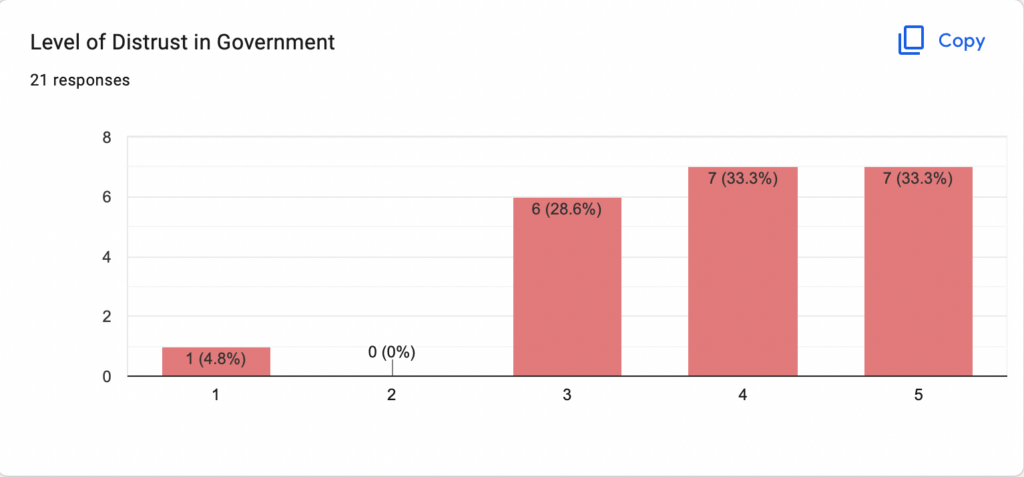
Below, you see the levels of distrust in large corporations:
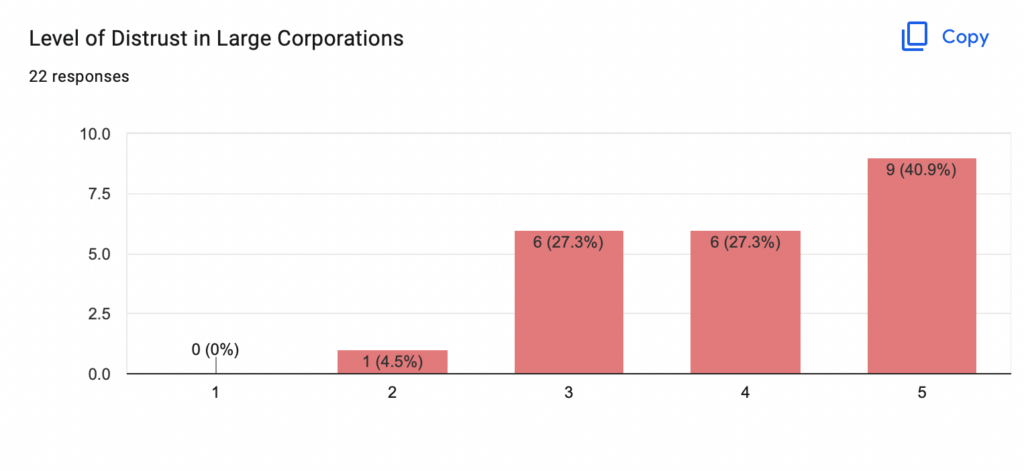
Generation Z and Addictive Chemicals
When doing this article, I had some rather interesting results with regard to addictive chemicals. Below is a question that asked young people whether they have access to addictive chemicals but choose not to use them.
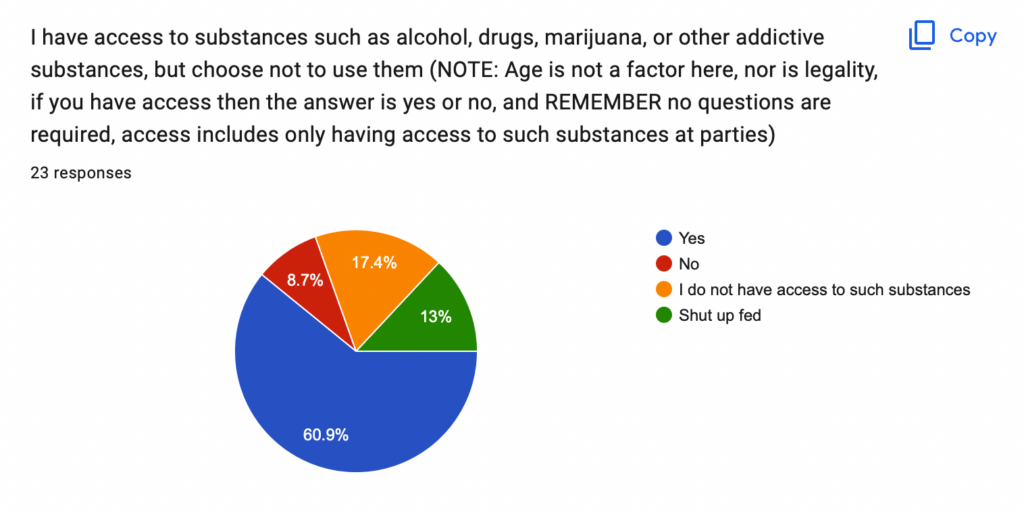
In addition, I asked a question about which substances people abstain from, and the results were shocking:

This gets on a perfect idea. Caffeine is an addictive chemical. Even though it is addictive, it won’t kill you or really do anywhere near as much harm as the other substances, but over half of the people from Generation Z choose not to drink it.
“Mind Control”
People from Generation Z do not drink caffeine, not because they do not like it, but because they don’t want to be addicted to anything. In fact, this other question proves why.
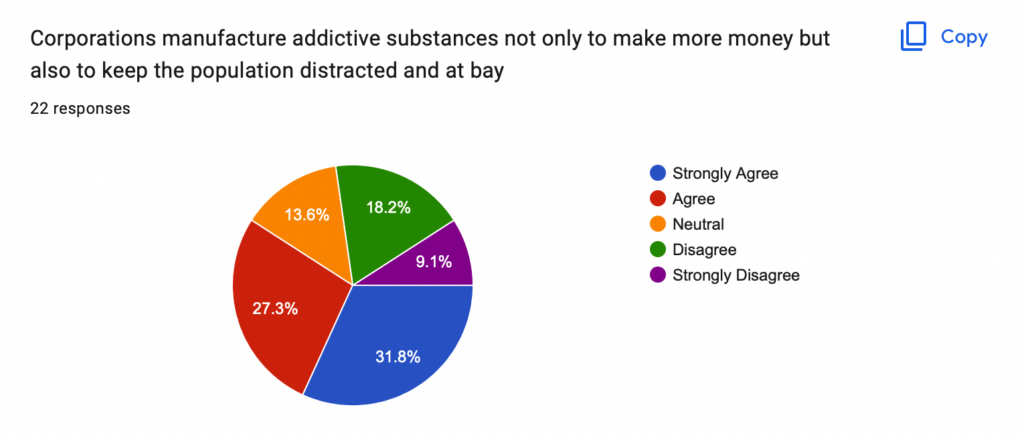
Generation Z and Social Media
Examine the following. People from Generation Z know that social media is addictive. In fact, many of us likely laugh at our parents when they use social media and inform them that they are addicted.
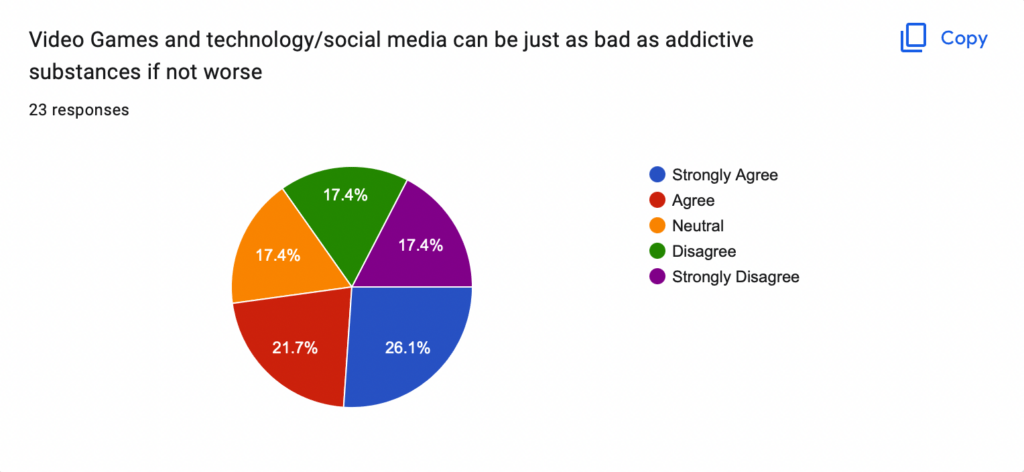
Understanding the Data
Considering the normal way people define insanity, over half of the young people between 15-26 are insane. I would rather define insanity as they are not out to get you. Anyone who clearly fails to think critically about any ideology and understands that nothing is perfect and works all the time is insane.
The people that have political beliefs that trust the government or either party the most are the people who are current threats in today’s society. People who many believe to be absolute nutjobs speak the truth. Just because you’re paranoid doesn’t mean they aren’t out to get you.







“I hate fish”
“Well hater, guess you don’t have to eat any then”
“Oh no, I like eating them. Thats one of the ways i let them know how much i hate ‘em”
-exchange between Louis and Francis in Left4Dead